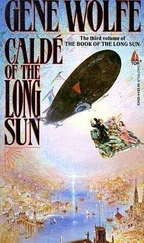Wolfe, Gene - The Best of Gene Wolfe
Здесь есть возможность читать онлайн «Wolfe, Gene - The Best of Gene Wolfe» весь текст электронной книги совершенно бесплатно (целиком полную версию без сокращений). В некоторых случаях можно слушать аудио, скачать через торрент в формате fb2 и присутствует краткое содержание. Жанр: Старинная литература, на английском языке. Описание произведения, (предисловие) а так же отзывы посетителей доступны на портале библиотеки ЛибКат.
- Название:The Best of Gene Wolfe
- Автор:
- Жанр:
- Год:неизвестен
- ISBN:нет данных
- Рейтинг книги:5 / 5. Голосов: 1
-
Избранное:Добавить в избранное
- Отзывы:
-
Ваша оценка:
- 100
- 1
- 2
- 3
- 4
- 5
The Best of Gene Wolfe: краткое содержание, описание и аннотация
Предлагаем к чтению аннотацию, описание, краткое содержание или предисловие (зависит от того, что написал сам автор книги «The Best of Gene Wolfe»). Если вы не нашли необходимую информацию о книге — напишите в комментариях, мы постараемся отыскать её.
The Best of Gene Wolfe — читать онлайн бесплатно полную книгу (весь текст) целиком
Ниже представлен текст книги, разбитый по страницам. Система сохранения места последней прочитанной страницы, позволяет с удобством читать онлайн бесплатно книгу «The Best of Gene Wolfe», без необходимости каждый раз заново искать на чём Вы остановились. Поставьте закладку, и сможете в любой момент перейти на страницу, на которой закончили чтение.
Интервал:
Закладка:
Two of my father’s demimondaines were waiting in the hall, costumed and painted until they seemed more alien than any abos, stately as Lombardy poplars and inhuman as specters, with green and yellow eyes made to look the size of eggs and inflated breasts pushed almost shoulder high; and though they maintained an inculcated composure I was pleasantly aware that they were startled to find me in the doorway. I bowed them in, but as the maid closed the door behind them my aunt said absently, “In a moment, girls. I want to show the boy here something; then he’s going to leave.”
The “something” was a photograph utilizing, as I supposed, some novelty technique which washed away all color save a light brown. It was small, and from its general appearance and crumbling edges very old. It showed a girl of twenty-five or so, thin and as nearly as I could judge rather tall, standing beside a stocky young man on a paved walkway and holding a baby. The walkway ran along the front of a remarkable house, a very long wooden house only a story in height, with a porch or veranda that changed its architectural style every twenty or thirty feet so as to give almost the impression of a number of exceedingly narrow houses constructed with their sidewalls in contact. I mention this detail, which I hardly noticed at the time, because I have so often since my release from prison tried to find some trace of this house. When I was first shown the picture I was much more interested in the girl’s face, and the baby’s. The latter was in fact scarcely visible, he being nearly smothered in white wool blankets. The girl had large features and a brilliant smile which held a suggestion of that rarely seen charm which is at once careless, poetic, and sly. Gypsy , was my first thought, but her complexion was surely too fair for that. Since on this world we are all descended from a relatively small group of colonists, we are rather a uniform population, but my studies had given me some familiarity with the original Terrestrial races, and my second guess, almost a certainty, was Celtic. “Wales,” I said aloud. “Or Scotland. Or Ireland.”
“What?” my aunt said. One of the girls giggled; they were seated on the divan now, their long, gleaming legs crossed before them like the varnished staffs of flags.
“It doesn’t matter.”
My aunt looked at me acutely and said, “You’re right. I’ll send for you and we’ll talk about this when we’ve both more leisure. For the present my maid will take you to your room.”
I remember nothing of the long walk the maid and I must have had back to the dormitory, or what excuses I gave Mr. Million for my unauthorized absence. Whatever they were, I suppose he penetrated them, or discovered the truth by questioning the servants, because no summons to return to my aunt’s apartment came, although I expected it daily for weeks afterward.
That night—I am reasonably sure it was the same night—I dreamed of the abos of Sainte Anne, abos dancing with plumes of fresh grass on their heads and arms and ankles, abos shaking their shields of woven rushes and their nephrite-tipped spears until the motion affected my bed and became, in shabby red cloth, the arms of my father’s valet come to summon me, as he did almost every night, to my father’s library.
That night, and this time I am quite certain it was the same night, that is, the night I first dreamed of the abos, the pattern of my hours with him, which had come over the four or five years past to have a predictable sequence of conversation, holographs, free association, and dismissal—a sequence I had come to think inalterable—changed. Following the preliminary talk designed, I feel sure, to put me at ease (at which it failed, as it always did), I was told to roll up a sleeve and lie down upon an old examining table in a corner of the room. My father then made me look at the wall, which meant at the shelves heaped with ragged notebooks. I felt a needle being thrust into the inner part of my arm, but my head was held down and my face turned away, so that I could neither sit up nor look at what he was doing. Then the needle was withdrawn and I was told to lie quietly.
After what seemed a very long time, during which my father occasionally spread my eyelids to look at my eyes or took my pulse, someone in a distant part of the room began to tell a very long and confusingly involved story. My father made notes of what was said, and occasionally stopped to ask questions I found it unnecessary to answer, since the storyteller did it for me.
The drug my father had given me did not, as I had imagined it would, lessen its hold on me as the hours passed. Instead it seemed to carry me progressively further from reality and the mode of consciousness best suited to preserving the individuality of thought. The peeling leather of the examination table vanished under me, and was now the deck of a ship, now the wing of a dove beating far above the world; and whether the voice I heard reciting was my own or my father’s I no longer cared. It was pitched sometimes higher, sometimes lower, but then I felt myself at times to be speaking from the depths of a chest larger than my own, and his voice, identified as such by the soft rustling of the pages of his notebook, might seem the high, treble cries of the racing children in the streets as I heard them in summer when I thrust my head through the windows at the base of the library dome.
W
ith that night my life changed again. The drugs—for there seemed to be several, and although the effect I have described was the usual one, there were also times when I found it impossible to lie still but ran up and down for hours as I talked, or sank into blissful or indescribably frightening dreams—affected my health. I often wakened in the morning with a headache that kept me in agony all day, and I became subject to periods of extreme nervousness and apprehensiveness. Most frightening of all, whole sections of days sometimes disappeared, so that I found myself awake and dressed, reading, walking, and even talking, with no memory at all of anything that had happened since I had lain muttering to the ceiling in my father’s library the night before.
The lessons I had had with David did not cease, but in some sense Mr. Million’s role and mine were now reversed. It was I, now, who insisted on holding our classes when they were held at all, and it was I who chose the subject matter and, in most cases, questioned David and Mr. Million about it. But often when they were at the library or the park I remained in bed reading, and I believe there were many times when I read and studied from the time I found myself conscious in my bed until my father’s valet came for me again.
David’s interviews with our father, I should note here, suffered the same changes as my own and at the same time, but since they were less frequent—and they became less and less frequent as the hundred days of summer wore away to autumn and at last to the long winter—and he seemed on the whole to have less adverse reactions to the drugs, the effect on him was not nearly as great.
If at any single time, it was during this winter that I came to the end of childhood. My new ill health forced me away from childish activities, and encouraged the experiments I was carrying out on small animals, and my dissections of the bodies Mr. Million supplied in an unending stream of open mouths and staring eyes. Too, I studied or read, as I have said, for hours on end, or simply lay with my hands behind my head while I struggled to recall, perhaps for whole days together, the narratives I had heard myself give my father. Neither David nor I could ever remember enough even to build a coherent theory of the nature of the questions asked us, but I have still certain scenes fixed in my memory which I am sure I have never beheld in fact, and I believe these are my visualizations of suggestions whispered while I bobbed and dived through those altered states of consciousness.
Читать дальшеИнтервал:
Закладка:
Похожие книги на «The Best of Gene Wolfe»
Представляем Вашему вниманию похожие книги на «The Best of Gene Wolfe» списком для выбора. Мы отобрали схожую по названию и смыслу литературу в надежде предоставить читателям больше вариантов отыскать новые, интересные, ещё непрочитанные произведения.
Обсуждение, отзывы о книге «The Best of Gene Wolfe» и просто собственные мнения читателей. Оставьте ваши комментарии, напишите, что Вы думаете о произведении, его смысле или главных героях. Укажите что конкретно понравилось, а что нет, и почему Вы так считаете.









